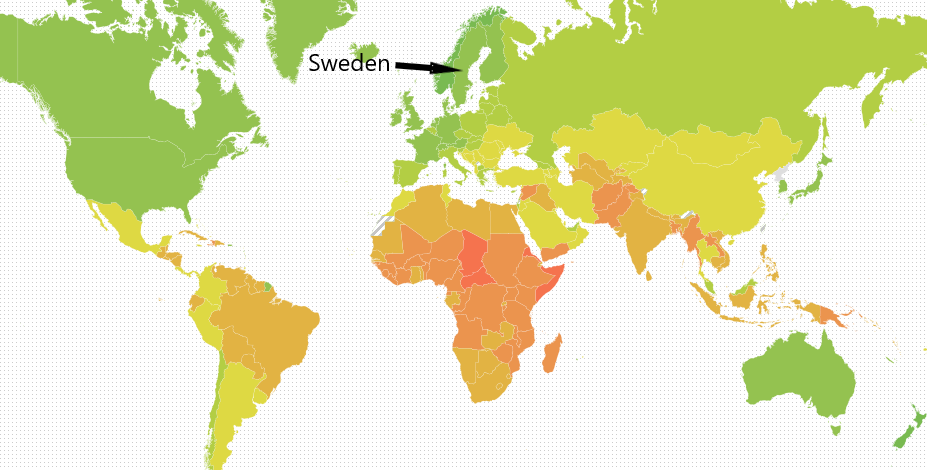Solar Geoengineering and Public Engagement Trolling
A first test of a long-planned outdoor solar geoengineering experiment has been delayed–again. Why?
It has been a busy week in solar geoengineering. Last week, the US National Academies released a report that offers recommendations for a research program and for governance of research. (A few of us will post our thoughts on the report here soon.) Here I discuss developments regarding outdoor solar geoengineering experiments, of which there have been only a few. A couple weeks ago, I wrote of opposition to a long-planned outdoor test of equipment that Harvard-based researchers would conduct in Sweden:
The Stratospheric Controlled Perturbation Experiment (SCoPEx) would involve the launch of a balloon into the stratosphere, where it would move horizontally, spray one or more fine mists, and then circle back to measure chemical and physical characteristics and processes. Even though this would pose negligible environmental risks… the Harvard University team set up an independent Advisory Committee… to suggest governance procedures and to recommend whether the outdoor experiment should go forward. In the meantime, the scientists decided to first test the balloon and other equipment, with no spraying.
Nevertheless, the strident opponents of solar geoengineering are digging in their heels. Last month, several green and anti-technology groups wrote to the government of Sweden, where the SCoPEx balloons are to launch. And this month, the [indigenous] Saami Council sent a similar one to the SCoPEx Advisory Committee [PDF]…
Both letters also emphasize the lack of engagement with the local populations.

Yesterday, the Advisory Committee announced that it:
is recommending that societal engagement should occur in Sweden before any SCoPEx research is conducted in the country… The Committee has recommended to Harvard and the research team that any equipment test flights in Sweden need to be suspended until the Committee can make a final recommendation about those flights based on a robust and inclusive public engagement in Sweden.
“The SCoPEx research team fully supports the Advisory Committee’s recommendation,” and the state-owned Swedish Space Corporation, which would provide flight services for the test and experiment, “has decided not to conduct the technical test flight planned for this summer.”
Some environmental groups and others have praised the postponement. Notably, all of them (to my knowledge) also oppose all solar geoengineering research. That was the case with the authors of both letters of protest. Likewise, the president of the Swedish Society for Nature Conservation said:
“It’s a rejection of a technology with the potential for extreme consequences that could alter hydrological cycles, disrupt monsoon patterns and increase drought,” she said, terming the techniques “too dangerous to ever be used”.
I suspect that these activist groups could not prevail if they stuck to their underlying motivation: that solar geoengineering should not be researched. They instead focus on governance procedures–measures that sound broadly reasonable (who could be opposed to public engagement?) but in practice drive SRM experiments into complex and interminable approval processes. The activists can often win on such procedural arguments. Yet there are invisible costs to postponing safe research: it delays the day when society can make an informed decision as to whether SRM can reduce risks and save lives, and it increases the chances that a desperate nation will deploy SRM without properly understanding the consequences. But these costs are borne by people who lack a voice in the debate. They–almost all victims of climate change–are elsewhere in space and time.
This seems to be a form of “trolling,” in the sense of instigating and protracting debates for other reasons. To the extent so, then these activists could perhaps be thought of as “public engagement trolls” who call for procedural roadblocks because publicly relying on their actual motivations would likely fail. The analogy is not perfect, as these activists do not hide their categorical opposition. And I don’t mean this to be necessarily negative. In fact, many important environmental victories have relied on procedure, not substance.
I recognize the legitimate reasons for engaging with the public and for taking indigenous groups’ concerns seriously. But because these are both “motherhood and apple pie” among environmentalists and progressives, they are also political third rails in these domains: Do not touch; risk of death.
Nevertheless, I wish to ask the central, difficult questions. First: Should an equipment test flight and an environmentally benign solar geoengineering experiment, neither of which pose local risks, be delayed due to a lack of local public engagement, including with indigenous groups? It is not clear. Research delays due to public engagement exercises come with costs, and not just those of carrying out the exercises. The greatest stakes regard preventing the harmful impacts of climate change. According to the new National Academies report:
The available research indicates that [solar geoengineering] could reduce surface temperatures and potentially ameliorate some risks posed by climate change (e.g., to avoid crossing critical climate “tipping points”; to reduce harmful impacts of weather extremes).
Note that SCoPEx has been planned for almost decade, and that the only other planned outdoor test of equipment for this leading proposed technique of solar geoengineering (stratospheric aerosol injection) was also cancelled for reasons that included a perception of insufficient public engagement.
If solar geoengineering could indeed reduce climate change impacts, then delaying its research and development delays such reductions and/or causes its use to be less well informed. While the indigenous Saami depend economically and culturally on the current climate, Sweden is the fifth-least climate-vulnerable country. The map below shows where the most climate-vulnerable ones are: sub-Saharan Africa and south Asia. Current and future residents there have the most at stake but were consulted in neither SCoPEx’s delay nor the previous experiment’s cancellation.

Second, and more generally, when should outdoor scientific experiments and other activities require public engagement? I am skeptical of, but not necessarily opposed to, calls for extended and frequent public engagement both because of the too-common “trolling” and because I am yet to hear clear answers to fundamental questions such as:
- Do public engagement exercises in general achieve their goals? How can we know the extent to which they have?
- Would the given public engagement exercise achieve its goals? How would we know?
- When is public engagement sufficient? How would we know?
I know neither under what conditions a solar geoengineering equipment test should be delayed due to a lack of public engagement, nor the standards for appropriate public engagement for outdoor scientific experiments.
When it comes to public engagement, there is no “right” level, but proportionality should be the watchword. Where an experiment carries local risks, then local groups should indeed be engaged. But when the risks are abstract, global, and temporally distant, then engagement should be ongoing and global, not a sequential step in experiment approval. It is noticeable that critics of SCoPEx all refer to distant, abstract risks because the test and experiment are safe. The people of Sweden are under no greater risks from SCoPEx than the people of Swaziland. The same is not true of the climate risks that solar geoengineering would seek to reduce. There is no clear, strong reason for privileging local voices when the stakes and/or are global. In such a wider conversation, the wider costs of delaying and cancelling tests and experiments could and should be part of informing decision-making. It seems that, in these cases, these have not been well considered.
Update (April 1 at 8:49 AM PDT): Opponents have issued this statement, including “the existential risks of this geoengineering technology disqualify it from ever being advanced – whether here or elsewhere…. Solar geoengineering technologies present fundamental risks that community consultation and engagement cannot resolve… [I]t’s time for a global permanent stop of this dangerous technology.”
Update (April 6 at 12:20 AM PDT): From the Harvard Crimson:
Saami Council Vice President Åsa Larsson-Blind acknowledged that the initial SCoPEx test has limited risks, but said her organization is “very, very” against the testing of solar geoengineering projects “anywhere,” citing long-term risks…
However, she said, the Council turned down the invitation to meet because that would be akin to “negotiation.”
“It’s an experience that we share with many Indigenous peoples around the world: the notion of dialogue and consultations may be misused,” Larsson-Blind said. “A dialogue would be seen as a negotiation, that if they made some adjustments, the tests can go ahead, and we would be fine with the testing. But this is not that kind of issue.”
Reader Comments
2 Replies to “Solar Geoengineering and Public Engagement Trolling”
Comments are closed.








This article mentions the Saami people but fails to even mention the legally protected rights of Free Prior and Informed Consent. The article is thus offensively inferring, without mentioning FPIC, that FPIC is “public engagement trolling.” This is a truly disturbing article that reeks of authoritarianism and jingoistic anti-democratic top down decision making, dressed up with some argumentative language that pretends at concern for the global south. I am surprised that both UCLA and UC Berkeley are allowing this kind of anti-civil society and anti-public engagement position to be published. This article basically denigrates the rights of civil society to engage on political affairs, and concludes that it is necessary to put “proportionality” on engagement from the public, and to limit local influence on decision making, because when civil society engages it is “trolling”. Truly offensive. And outright dangerous.
Gary,
Thanks for your thoughts. Note that I wrote “I recognize the legitimate reasons for engaging with the public and for taking indigenous groups’ concerns seriously.” I take the Saami’s concerns, including their call for public engagement, seriously here.
There seems to be a notable inconsistency between the Saami statements:
“We find it remarkable that the project has gone so far as to establish an agreement with SSC
on test flying without… having… entered into any dialogue with either the Swedish government, its authorities, the Swedish research community, Swedish civil society, or the Saami people”
and
“Solar geoengineering technologies present fundamental risks that community consultation and engagement cannot resolve.”
In my previous post https://legal-planet.org/2021/03/16/niabys-obstruct-research/ , I addressed the claim regarding free, prior, and informed consent. The United Nations Declaration on the Rights of Indigenous is not a binding agreement, and is not applicable to SCoPEx because it would not affect the Saami’s lands or territories and other resources.